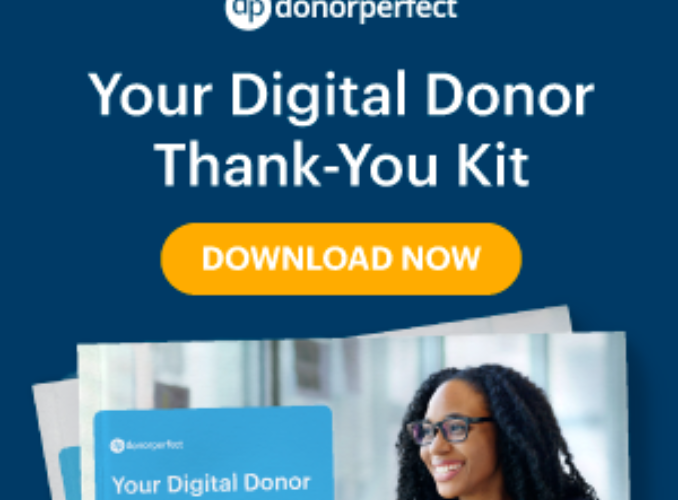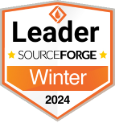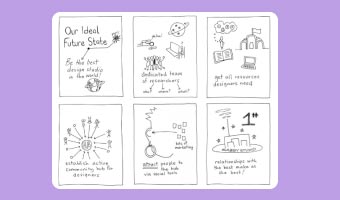Transform Your Nonprofit Board Into a Fundraising Powerhouse
Your nonprofit’s board members are more than just decision-makers—they are ambassadors, advocates, and fundraisers. When engaged effectively, your board can be a driving force behind fundraising success, especially in securing major gifts. Yet, many board members hesitate to step into this role due to uncertainty about how to contribute. Since 80% of donations come from 20% of supporters, it’s essential to engage board members in major gift fundraising.
In this blog, you will learn how to:
- Set board fundraising expectations
- Equip board members with fundraising tools
- Build major gift strategies through data
Pro tip: These strategies aren’t just for large nonprofits. If you’re a small team—or don’t have a formal development director—this guide will help you engage your board effectively at any size.
By equipping your board members with the right tools, strategies, and confidence, you can turn them into powerful fundraising partners. Here’s how to get started:
1. Set clear fundraising expectations for board members
Setting clear and achievable expectations is the first step in mobilizing your board to fundraise. Many board members join without fully understanding their role in supporting financial goals. Being transparent helps create shared ownership of fundraising success.
Consider the following ways to help clarify expectations:
- Clearly outline fundraising responsibilities at onboarding and throughout board service
- Establish a board giving policy where members commit to making a personally meaningful gift
- Encourage board members to leverage their networks by introducing potential donors
- Provide training and messaging resources to help them communicate your mission effectively
- Define specific fundraising roles such as event host, stewardship ambassador, or peer solicitor
When board members understand what’s expected, they feel more empowered and motivated to participate in fundraising.
2. Equip your board with nonprofit fundraising tools and technology
Even if board members aren’t directly soliciting donations, equipping them with the right tools ensures they can support your development efforts effectively and confidently.
Essential nonprofit board fundraising tools:
- Board member fundraising toolkits – Include talking points, donor FAQs, and email templates
- Donor management system – Provide access to donor insights and giving history (based on your organization’s donor privacy policies)
- Peer-to-peer fundraising platforms – Allow members to create personal fundraising pages for events like a race or a DIY fundraising initiative
- Crowdfunding tools – Support targeted campaigns tied to specific programs or goals
- Fundraising dashboards and reports – Offer real-time data to guide board engagement
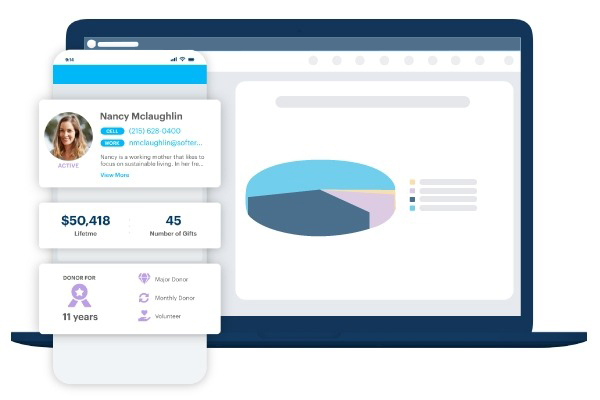
DonorPerfect’s core features and integrations allow nonprofits to track fundraising efforts, access donor insights, and personalize outreach—all from one platform.
3. Use donor reports to engage and motivate your board
Regular reporting keeps board members informed and motivated. It helps them see their impact and make data-driven decisions.
Use these reports to drive board engagement:
- Donor giving trends report – Identify major gift prospects and high-value donors
- Campaign performance dashboard – Show fundraising progress and board impact
- Board engagement report – Highlight participation in fundraising activities
- Soft credit report – Track donations that board members help secure, offering motivation through friendly competition and recognition
- Donor contact report – Help board members follow up with potential supporters
Structured, transparent reporting turns fundraising from an abstract concept into a measurable, motivating experience for your board.
4. Set major gift fundraising goals with your board members
Major gifts are essential for your nonprofit’s long-term sustainability, and board members can play an instrumental role in identifying, cultivating, and securing these transformative contributions. The process begins by working with your board to set clear, strategic goals based on your organization’s mission and fundraising potential—not just your budget shortfall.
Collaborate with your board to:
- Define what constitutes a major gift based on your unique donor base and your organization’s financials. For example, many small to mid-sized nonprofits consider $5,000 a major gift, while larger organizations may set the threshold at $10,000, $25,000, $50,000, or more.
- Review your fundraising history and evaluate current donor capacity.
- Use prospect research and donor data to develop realistic goals based on qualified major gift prospects.
- Segment your donor base and determine the number of prospects needed for each major gift level.
- Establish objectives like increasing major gift revenue, improving major donor retention, or expanding your pipeline of high-capacity supporters.
By involving your board in the major gift goal-setting process, you not only tap into their networks, but also foster shared accountability and alignment toward mission-driven outcomes.
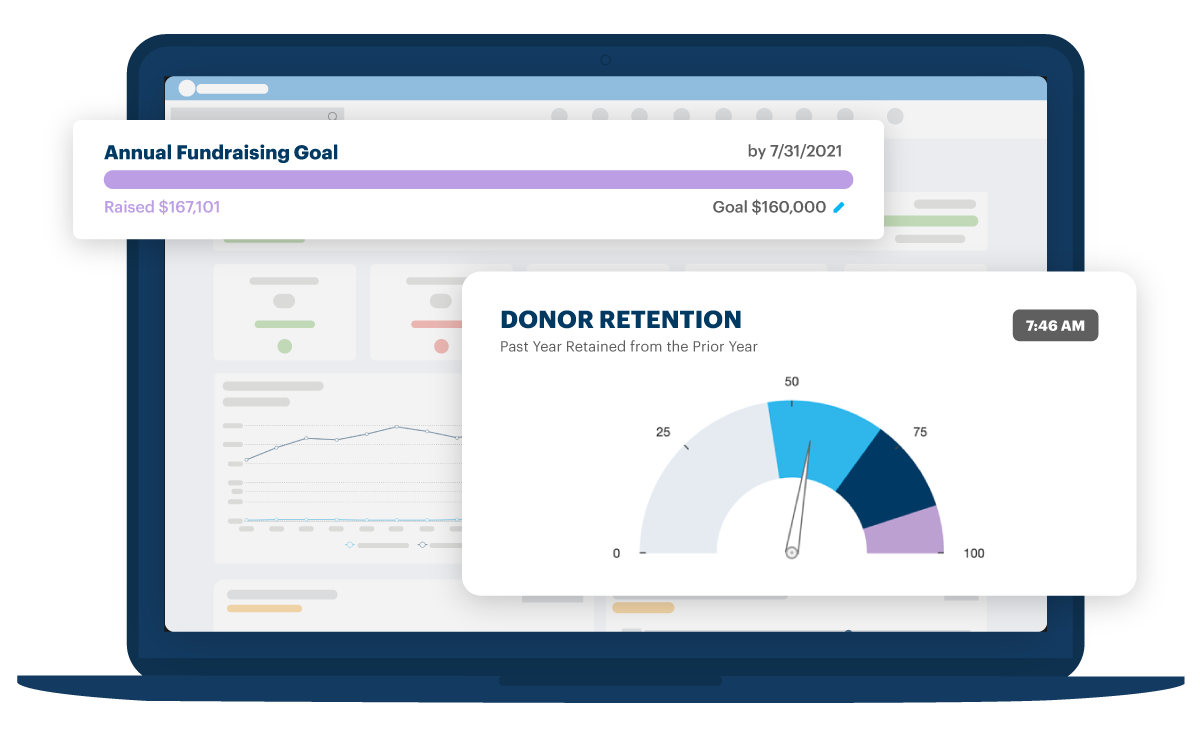
DonorPerfect’s fundraising dashboards can help you track major gift progress, donor retention, and board engagement—delivering actionable insights to drive smarter decisions.
Use donor data to guide major gift strategies
Once your goals are established, use donor data to drive your strategy and fundraising management software to analyze past giving behavior, identify patterns, and highlight prospects with the greatest potential for impact.
Encourage your board to review donor profiles and determine who in their networks could be a promising lead. Support them with donor insights, giving histories, and engagement activity summaries to facilitate stronger conversations and cultivation efforts.
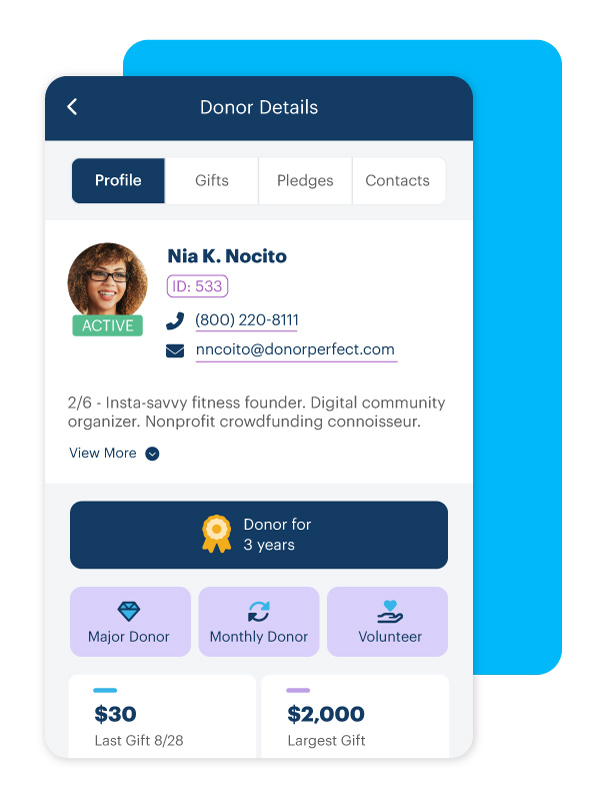
With DP Mobile, a free fundraising app that offers convenient reports and concise donor profiles, board members can engage with donors from their phones.
Visual tools like gift tables (or gift pyramids) can help you assess prospect coverage and gift distribution.
Sample Major Gift Goal: $1 Million

For example, if your major gift goal is $1 million:
- You might aim for one $200,000 lead gift and several mid-tier gifts to build toward your target
- You should have three to four qualified prospects for each gift level to ensure a successful outcome
If a donor declines at one level, they may still contribute at a lower level, keeping your momentum strong.
If you are looking to develop a new program to secure large gifts, check out our video, How to Create a Major Gifts Program and Find Major Donors.
For further strategies on identifying and targeting major donors, explore these resources:
5. Build personalized cultivation plans for major gifts
Major gift fundraising is not just about the ask—it’s about building meaningful relationships. Work with your board to create personalized plans for each major donor prospect.
Effective strategies include:
- Assign prospects to board members with existing connections
- Host exclusive donor events or meetings for deeper engagement
- Send regular impact updates and facilitate recognition opportunities
When board members are involved in relationship-building, they feel more connected to the mission and the fundraising process.
6. Encourage your board to support major donor engagement
Your board members bring unique networks and influence to the table. They don’t have to be expert fundraisers to make a major impact.
Guide board participation in the major gift process through:
- Identifying major gift prospects within their personal and professional networks
- Building relationships through events, meetings, and personal outreach
- Participating in donor conversations and major gift solicitations
- Stewarding donors by sending thank-you messages and providing impact updates
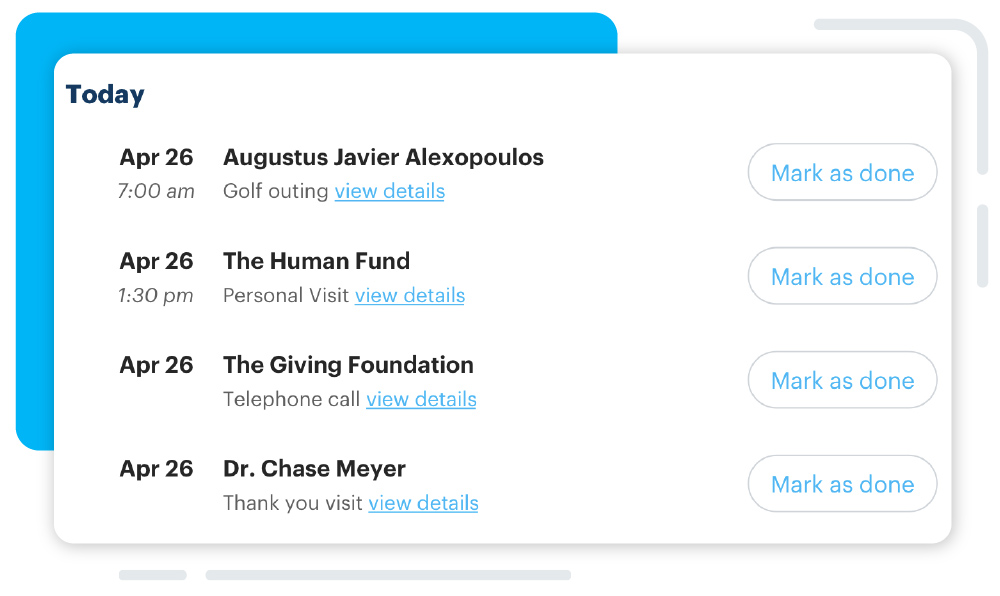
Every DonorPerfect plan comes with fundraising tools to manage donor contacts, communicate with constituents, and cultivate major donor relationships.
7. Offer board members hands-on fundraising training
Not all board members have fundraising experience, and that’s okay! A little training goes a long way toward building their confidence, fundraising abilities, and comfort level.
Support their development with:
- Role-playing exercises to practice donor conversations
- Shadowing opportunities with experienced fundraisers
- Workshops on major giving and donor engagement strategies

DonorPerfect has your team covered with nonprofit CRM training. From live webinars to personalized training, we’re here to support staff and board development.
8. Involve your board in fundraising events and campaigns
Events and fundraising campaigns are excellent opportunities for board members to engage their networks and raise awareness about your mission. Invite board members to:
- Host donor cultivation events at home or work
- Serve as ambassadors at fundraising events to connect with supporters
- Champion online campaigns by promoting them through personal outreach
When board members see fundraising as community building rather than solicitation, they’re more likely to get involved.
9. Recognize and celebrate board fundraising achievements
Recognition and celebration are key to building a positive fundraising culture. Board members who feel appreciated are more likely to stay engaged.
Try these approaches:
- Publicly acknowledge board donations in meetings and newsletters based on their preferences and your nonprofit’s gift acknowledgment and privacy policies.
- Create friendly fundraising competitions with incentives.
- Celebrate milestones and key contributions.
Simple gestures of appreciation go a long way in strengthening board morale and fundraising momentum.
10. Deepen board engagement and long-term commitment
An engaged board leads to stronger fundraising outcomes. Keep your board inspired and aligned with your fundraising goals through consistent communication and meaningful involvement.
Maintain engagement by:
- Sharing regular fundraising updates during board meetings
- Offering mentorship opportunities to newer board members
- Striving for a diverse board that reflects your community and donor base
Empower your board to make a lasting impact
With the right expectations, tools, training, and recognition, your board can become a high-impact fundraising force. Encourage board members to embrace their roles as fundraisers and watch your organization thrive.
Key takeaways for board fundraising success:
- Set clear expectations
- Equip your board with the right tools
- Use data and reporting to guide efforts
- Invest in training and recognition
To strengthen your board’s fundraising potential, regularly discuss topics such as donor management, gift tracking, strategic engagement, and the tools that support these efforts.
For continued learning, check out Joan Gary’s 10 Nonprofit Leadership Tips for 2025 to explore more ways you and your team can grow professionally while leveraging board involvement.
Ready to equip your board with the tools for fundraising success? Explore how DonorPerfect’s donor management features support board engagement and major gift growth.
Frequently Asked Questions
1. Why is fundraising an important role for nonprofit board members?
2. How can board members feel more comfortable asking for donations?
3. What technology tools can help board members with fundraising?
4. How can board members who don’t like fundraising still contribute?
5. How can nonprofits foster a culture of fundraising within the board?
6. How do you measure the success of board-led fundraising efforts?
Sign up for a DonorPerfect demo
Learn more about essential donor management features, today!
